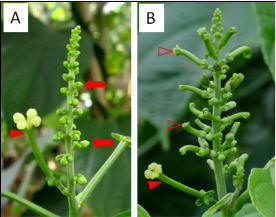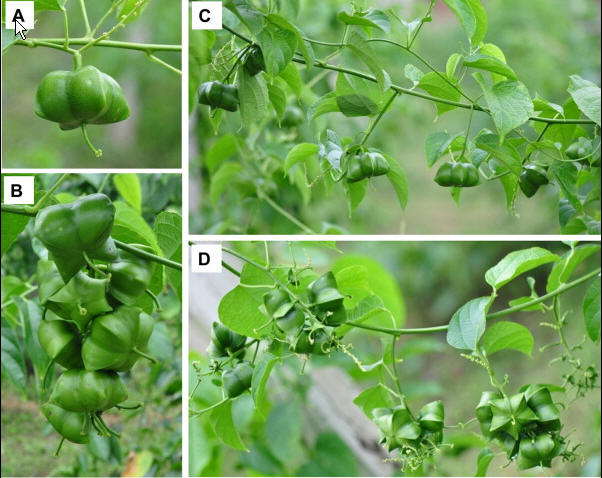
Benzyladenine Is a Potential Growth Regulator to Improve P. volubilis Yield
Jun 17, 2014 Email"> PrintText Size

Plukenetia volubilis, also known as Sacha inchi or Inca peanut, is a perennial oilseed vine belonging to the Euphorbiaceae family. Its seeds contain a high content of polyunsaturated fatty acids. There are about 60 small male flowers, which arrange in narrow raceme-like inflorescences, with only one or two female flowers near the base of the inflorescences. The paucity of female flowers may be one of the main factors influencing the yield potential of P. volubilis. Thus, developing a method to increase the number of female flowers will be helpful in improving the yield of this crop.
Prof. XU Zengfu and his team of Xishuangbanna Tropical Botanical Garden (XTBG) investigated the effects of exogenous application of 6-benzyladenine (BA, a synthetic compound with cytokinin activity) on floral feminization and fruit yield of P. volubilis.
Exogenous application of BA converted male flowers on most of the inflorescences to female flowers, and approximately 8–20% of the induced female flowers further developed into fruits. BA treatment also significantly increased fruiting of P. volubilis.
The results of their study indicated that cytokinin might play an important role in female flower development of P. volubilis. Thus, there is great potential to use this plant growth regulator to improve the fruit yield of P. volubilis by increasing the number of female flowers.
The study entitled “Benzyladenine treatment promotes floral feminization and fruiting in a promising oilseed crop Plukenetia volubilis” has been published online in Industrial Crops and Products.

(A) Inflorescence of control trees; (B) inflorescence of trees treated with 20 mg/L BA (Image by FU Qiantang)

(A) Infructescence from control trees; (B) infructescence from trees treated with 20 mg/L BA; (C) fruiting branch from control trees; (D) fruiting branch from trees treated with 20 mg/L BA (Image by FU Qiantang)
Plukenetia volubilis, also known as Sacha inchi or Inca peanut, is a perennial oilseed vine belonging to the Euphorbiaceae family. Its seeds contain a high content of polyunsaturated fatty acids. There are about 60 small male flowers, which arrange in narrow raceme-like inflorescences, with only one or two female flowers near the base of the inflorescences. The paucity of female flowers may be one of the main factors influencing the yield potential of P. volubilis. Thus, developing a method to increase the number of female flowers will be helpful in improving the yield of this crop.
Prof. XU Zengfu and his team of Xishuangbanna Tropical Botanical Garden (XTBG) investigated the effects of exogenous application of 6-benzyladenine (BA, a synthetic compound with cytokinin activity) on floral feminization and fruit yield of P. volubilis.
Exogenous application of BA converted male flowers on most of the inflorescences to female flowers, and approximately 8–20% of the induced female flowers further developed into fruits. BA treatment also significantly increased fruiting of P. volubilis.
The results of their study indicated that cytokinin might play an important role in female flower development of P. volubilis. Thus, there is great potential to use this plant growth regulator to improve the fruit yield of P. volubilis by increasing the number of female flowers.
The study entitled “Benzyladenine treatment promotes floral feminization and fruiting in a promising oilseed crop Plukenetia volubilis” has been published online in Industrial Crops and Products.

(A) Inflorescence of control trees; (B) inflorescence of trees treated with 20 mg/L BA (Image by FU Qiantang)

(A) Infructescence from control trees; (B) infructescence from trees treated with 20 mg/L BA; (C) fruiting branch from control trees; (D) fruiting branch from trees treated with 20 mg/L BA (Image by FU Qiantang)
CAS Institutes
There are 124 Institutions directly under the CAS by the end of 2012, with 104 research institutes, five universities & supporting organizations, 12 management organizations that consist of the headquarters and branches, and three other units. Moreover, there are 25 legal entities affiliated and 22 CAS invested holding enterprisesThere are 124 I...>> more
Contact Us

Chinese Academy of Sciences
Add: 52 Sanlihe Rd., Xicheng District, Beijing, China
Postcode: 100864
Tel: 86-10-68597592 (day) 86-10-68597289 (night)
Fax: 86-10-68511095 (day) 86-10-68512458 (night)
E-mail: cas_en@cas.cn

